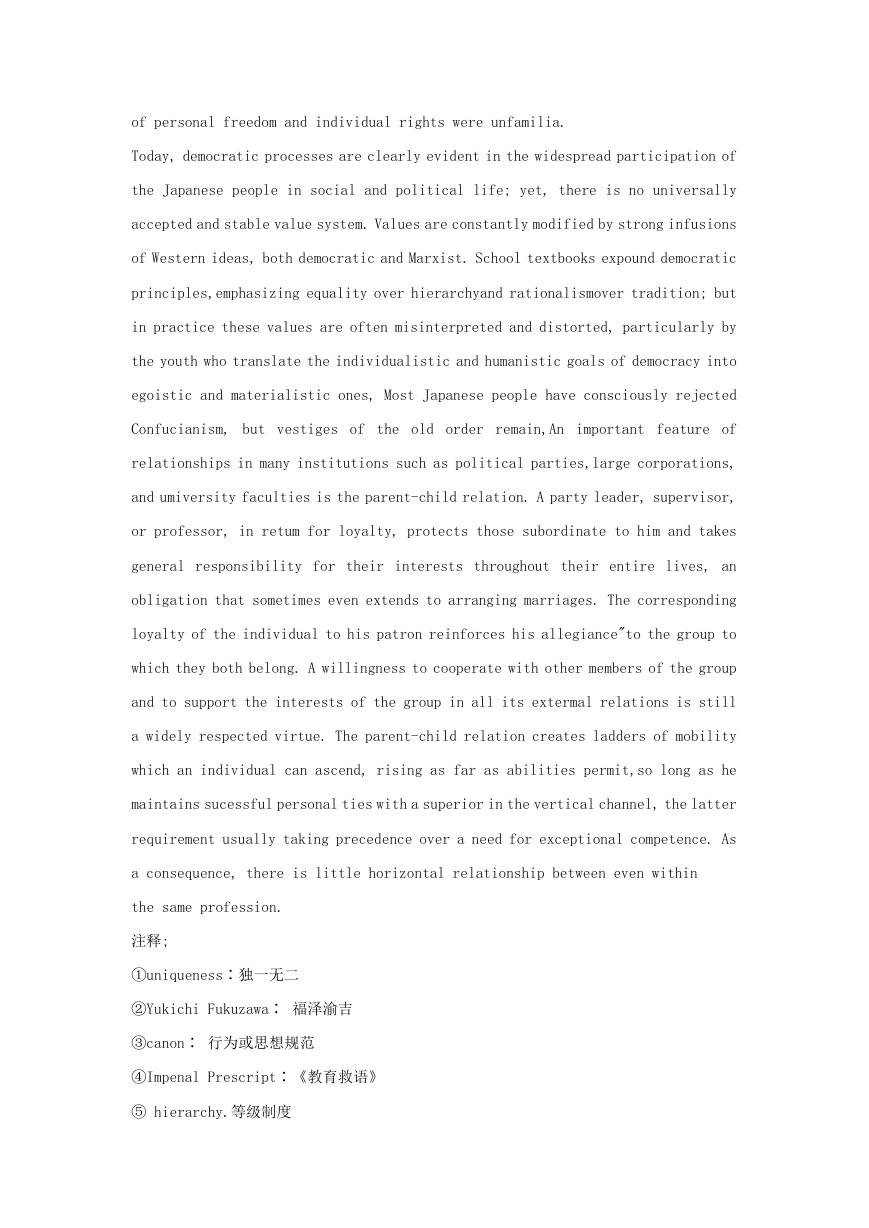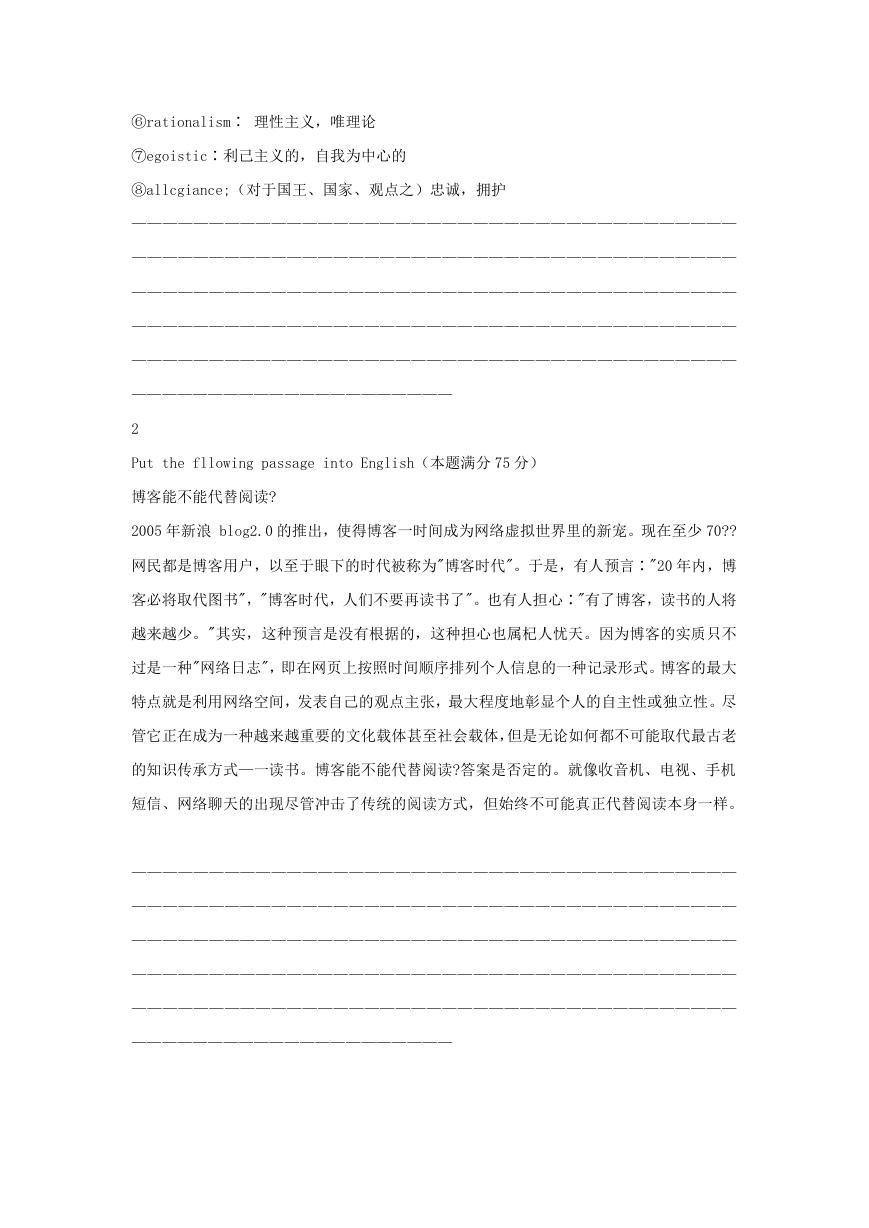2007 年上海海事大学英汉互译考研真题
ote:try to improve your translations again and again until the and of the time
allotted (3 hours)
1
Put the following passage into Chinese∶(本题满分 75 分)
Japanese Character
The uriqueness" of the Japanese character is the result of two seemingly
contradictory forces: the strength of traditions, and selective receptivity to
foreign achievements and inventions. As early as the I860s,there were counter
movements to the traditional orientation. Yukichi
Fukuzawa, the mnost eloquent spokesman of Japan's"Enlightenment,"claimed"The
Confucian civilization of the East seems to me to lack two things possessed by Western
civilization: science in the material spherc and a sense of independence in the
spiritual
sphere."Fukuzawa's
great
influence
is
found
in
the
free
and
individualistic philosophy of the Education Code of 1872, but he was not able to
prevent the government from turming back to the canons of Confucian thought in the
Imperial
Prescript" of 1890.Another intcrlude of relative liberalism followed
World War I, when the democratic idealism of President Woodrow
Wilson had an important impact on Japanese intelectuals and, especially students;
but
more
important
was
the
Leninist
ideology
of
the
1917
Bolshevik
Revolution.Again,in the early 1930s, nationalism and militarism became dominant,
largely as a result of failing economic conditions. Following the end of World War
II, substantial changes were undcrtaken in Japan to liberate the individual from
authoritarian restraints.
The new democratic value system was accepted by many teachers,
students,intellectuals, and old liberals, but it was not immediately whraced by the
society as a whole.Japanese traditions were dominated by group vaiues, and notions
�
of personal freedom and individual rights were unfamilia.
Today, democratic processes are clearly evident in the widespread participation of
the Japanese people in social and political life; yet, there is no universally
accepted and stable value system. Values are constantly modified by strong infusions
of Western ideas, both democratic and Marxist. School textbooks expound democratic
principles,emphasizing equality over hierarchyand rationalismover tradition; but
in practice these values are often misinterpreted and distorted, particularly by
the youth who translate the individualistic and humanistic goals of democracy into
egoistic and materialistic ones, Most Japanese people have consciously rejected
Confucianism, but vestiges of the old order remain,An important feature of
relationships in many institutions such as political parties,large corporations,
and umiversity faculties is the parent-child relation. A party leader, supervisor,
or professor, in retum for loyalty, protects those subordinate to him and takes
general responsibility for their interests throughout their entire lives, an
obligation that sometimes even extends to arranging marriages. The corresponding
loyalty of the individual to his patron reinforces his allegiance"to the group to
which they both belong. A willingness to cooperate with other members of the group
and to support the interests of the group in all its extermal relations is still
a widely respected virtue. The parent-child relation creates ladders of mobility
which an individual can ascend, rising as far as abilities permit,so long as he
maintains sucessful personal ties with a superior in the vertical channel, the latter
requirement usually taking precedence over a need for exceptional competence. As
a consequence, there is little horizontal relationship between even within
the same profession.
注释;
①uniqueness∶独一无二
②Yukichi Fukuzawa∶ 福泽渝吉
③canon∶ 行为或思想规范
④Impenal Prescript∶《教育救语》
⑤ hierarchy.等级制度
�
⑥rationalism∶ 理性主义,唯理论
⑦egoistic∶利己主义的,自我为中心的
⑧allcgiance;(对于国王、国家、观点之)忠诚,拥护
———————————————————————————————————————
———————————————————————————————————————
———————————————————————————————————————
———————————————————————————————————————
———————————————————————————————————————
—————————————————————
2
Put the fllowing passage into English(本题满分 75 分)
博客能不能代替阅读?
2005 年新浪 blog2.0 的推出,使得博客一时间成为网络虚拟世界里的新宠。现在至少 70??
网民都是博客用户,以至于眼下的时代被称为"博客时代"。于是,有人预言∶"20 年内,博
客必将取代图书","博客时代,人们不要再读书了"。也有人担心∶"有了博客,读书的人将
越来越少。"其实,这种预言是没有根据的,这种担心也属杞人忧天。因为博客的实质只不
过是一种"网络日志",即在网页上按照时间顺序排列个人信息的一种记录形式。博客的最大
特点就是利用网络空间,发表自己的观点主张,最大程度地彰显个人的自主性或独立性。尽
管它正在成为一种越来越重要的文化载体甚至社会载体,但是无论如何都不可能取代最古老
的知识传承方式—一读书。博客能不能代替阅读?答案是否定的。就像收音机、电视、手机
短信、网络聊天的出现尽管冲击了传统的阅读方式,但始终不可能真正代替阅读本身一样。
———————————————————————————————————————
———————————————————————————————————————
———————————————————————————————————————
———————————————————————————————————————
———————————————————————————————————————
—————————————————————
�






 2023年江西萍乡中考道德与法治真题及答案.doc
2023年江西萍乡中考道德与法治真题及答案.doc 2012年重庆南川中考生物真题及答案.doc
2012年重庆南川中考生物真题及答案.doc 2013年江西师范大学地理学综合及文艺理论基础考研真题.doc
2013年江西师范大学地理学综合及文艺理论基础考研真题.doc 2020年四川甘孜小升初语文真题及答案I卷.doc
2020年四川甘孜小升初语文真题及答案I卷.doc 2020年注册岩土工程师专业基础考试真题及答案.doc
2020年注册岩土工程师专业基础考试真题及答案.doc 2023-2024学年福建省厦门市九年级上学期数学月考试题及答案.doc
2023-2024学年福建省厦门市九年级上学期数学月考试题及答案.doc 2021-2022学年辽宁省沈阳市大东区九年级上学期语文期末试题及答案.doc
2021-2022学年辽宁省沈阳市大东区九年级上学期语文期末试题及答案.doc 2022-2023学年北京东城区初三第一学期物理期末试卷及答案.doc
2022-2023学年北京东城区初三第一学期物理期末试卷及答案.doc 2018上半年江西教师资格初中地理学科知识与教学能力真题及答案.doc
2018上半年江西教师资格初中地理学科知识与教学能力真题及答案.doc 2012年河北国家公务员申论考试真题及答案-省级.doc
2012年河北国家公务员申论考试真题及答案-省级.doc 2020-2021学年江苏省扬州市江都区邵樊片九年级上学期数学第一次质量检测试题及答案.doc
2020-2021学年江苏省扬州市江都区邵樊片九年级上学期数学第一次质量检测试题及答案.doc 2022下半年黑龙江教师资格证中学综合素质真题及答案.doc
2022下半年黑龙江教师资格证中学综合素质真题及答案.doc